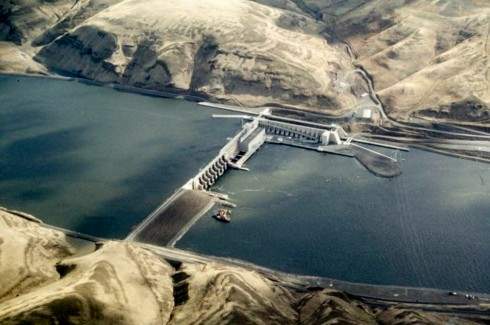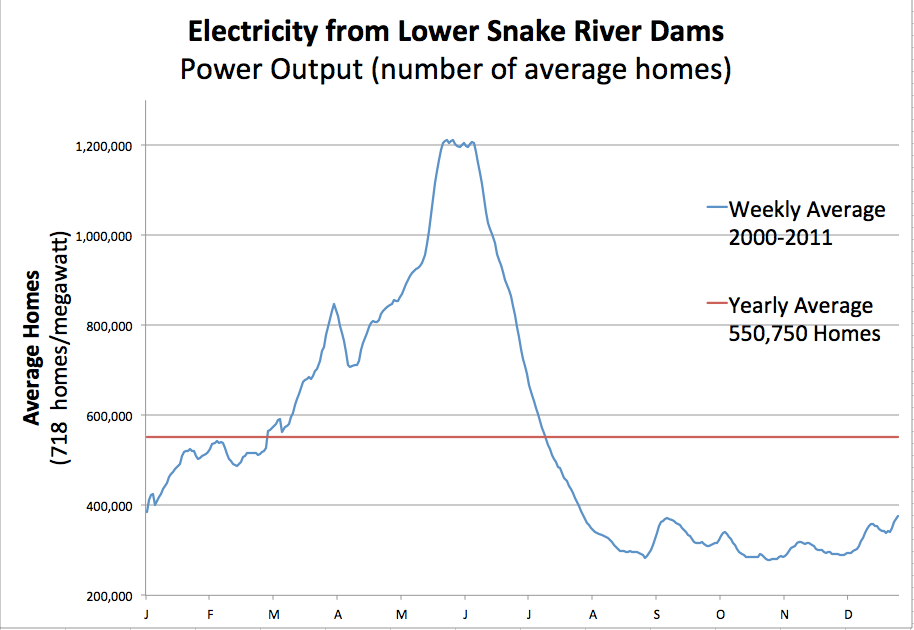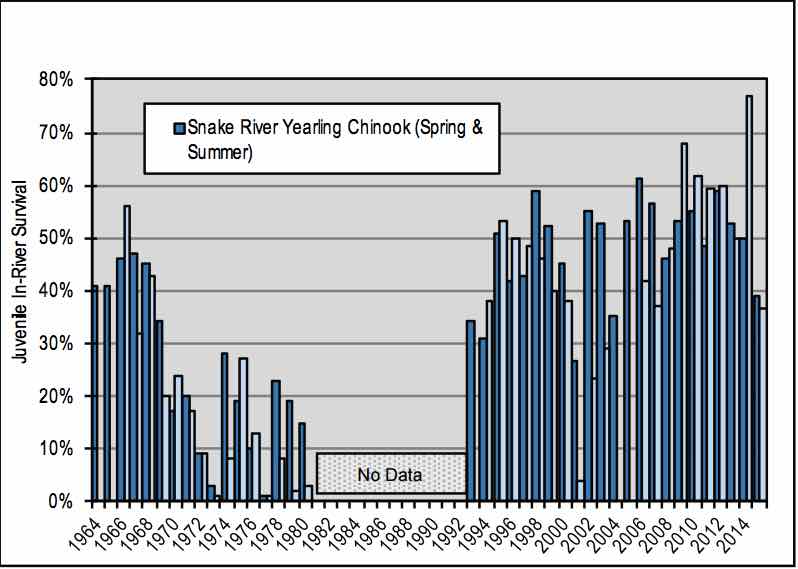forum
library
tutorial
contact

Keep Our
Snake River Dams
by Les Wigen
The Coeur d'Alene Press, December 22, 2016
|
the film forum library tutorial contact |

|
Keep Our
by Les Wigen
|
 Having lived in Whitman County most of my life, near Lacrosse, Wash., 17 miles from the Snake River, I have watched the transition of The Snake River System, from a free flowing river to one that has brought irrigation, fishing transportation, hydropower, recreation and jobs to the Port of Whitman County and the Lewiston-Clarkston area.
Having lived in Whitman County most of my life, near Lacrosse, Wash., 17 miles from the Snake River, I have watched the transition of The Snake River System, from a free flowing river to one that has brought irrigation, fishing transportation, hydropower, recreation and jobs to the Port of Whitman County and the Lewiston-Clarkston area.
Consider this water corridor to the Pacific Ocean, as just as Highway I-5 carries commerce to the West side corridor.
Taking out the Snake River dams would be like taking out the bridges on I-5 between Canada and the Oregon border. Taking out the Snake River dams would be like taking out the Ballard Locks to return salmon to Lake Washington.
Rep. Jim McDermott from Seattle put a bill on the House Floor in August 1999 to breach our Snake River dams.
The decline in population of salmon and steelhead started prior to construction of the four Snake River dams.
The record, the public record of Idaho will prove that several lakes off the Salmon River in Idaho were poisoned by the Idaho Department of Fish and Game in the 1950s, 1960s and 1970s into the 1990s to get rid of the redeye sockeye salmon per the status of Snake River sockeye salmon final report dated June 26, 1990. This was done to turn the Stanley Basin Area Lakes into rainbow trout lakes.
The U.S. Army Corps of Engineers has spent $20 million conducting meetings and hearings all over the Pacific NW including Spokane, Washtucna, Clarkston, Colfax, Pomeroy and Lewiston. Loud and clear local citizens have said that removal of these dams would devastate Eastern Washington. We would lose more than 40 parks and ports along the river from Clarkston to the Tri-Cities.
The return rate of salmon is due to Pacific Ocean conditions over fishing by foreign countries, seals that devour 100 fish today, gill nets in the Columbia River and more than 35,000 Caspian terns that take up to 35 percent of the salmon and steelhead smolt.
In 2001, we have seen the largest run of chinook salmon up the Snake River since 1938. The dams do not cause the decline in the number of salmon. Since 2001, we have had record numbers of salmon and steelhead over Bonneville Dam and Lower Granite Dam. Check the Corps of Engineers fish returns of the last 15 years and you will see record returns of salmon and steelhead.
 Do not blame the decline of coastal fishing on our fish friendly dams.
Do not blame the decline of coastal fishing on our fish friendly dams.
Former U.S. Senators Henry Jackson and Warren Magnuson and Rep. Tom Foley attended the dedication of Little Goose Dam in 1970. They praised the accomplishment the dams brought in the Northwest. The four lower Snake River dams can produce a total of up to 1,000 megawatts, which is enough to power the Greater Seattle area. Yes, that's with clean waters that serve Washington, Oregon, Idaho and Montana, and energy-challenged California.
We need to amend the Endangered Species Act of 1973 to make certain that all aspects are considered; Science, people, jobs and way of life. We can save both the Snake River salmon and our Snake River dams.
To destroy the dams would bring extreme hardship, economically, socially and environmentally to Whitman, Asotin, Garfield, Columbia, Walla Walla, Franklin and Nez Pierce counties. The result would be the loss of recreation, hydropower, irrigation, transportation and thousands of jobs. And 140 miles of mud flats would be left in its wake. Would that make sense?
The Snake River dams are the greatest asset to the Pacific Northwest, west of the Mississippi.
Gov. Cecil Andrus of Idaho rode a jet boat to the base of Lower Granite Dam in 1992 and said, "I will save the Snake River salmon." The draw down was 80 feet on the back side of Lower Granite Dam. The road from Clarkston to Lower Granite Dam was destroyed and had to be closed because of the lack of slack water and cracks and that cost to Whitman County was in the thousands. The draw down river was the same size as the Spokane River floating down 20 miles of mud bars, approximately 100 yards on each side of the river.
Tom Foley said in his 1994 election, in Colfax, "that the Snake River dams will never be breached." He said, "Congress appropriated money to build the dams and Congress will have to appropriate money to take the dams out."

Let's work together to find a solution to the ocean fishing nets, the thousands of sea lions, Caspian terns and the gill nets in the Columbia River. This would allow for a 98 percent return of the salmon and steelhead to the Pacific Ocean from above Lower Granite Dam.
Thank you for your consideration of this essential issue for Whitman, Garfield, Columbia, Walla Walla, Asotin and Franklin counties, and Nez Pearce County in Idaho, who all border and rely greatly on the Snake River.
Related Pages:
Untruths About Dams by Les Wigen, BPA Watch, 3/20/5
learn more on topics covered in the film
see the video
read the script
learn the songs
discussion forum
